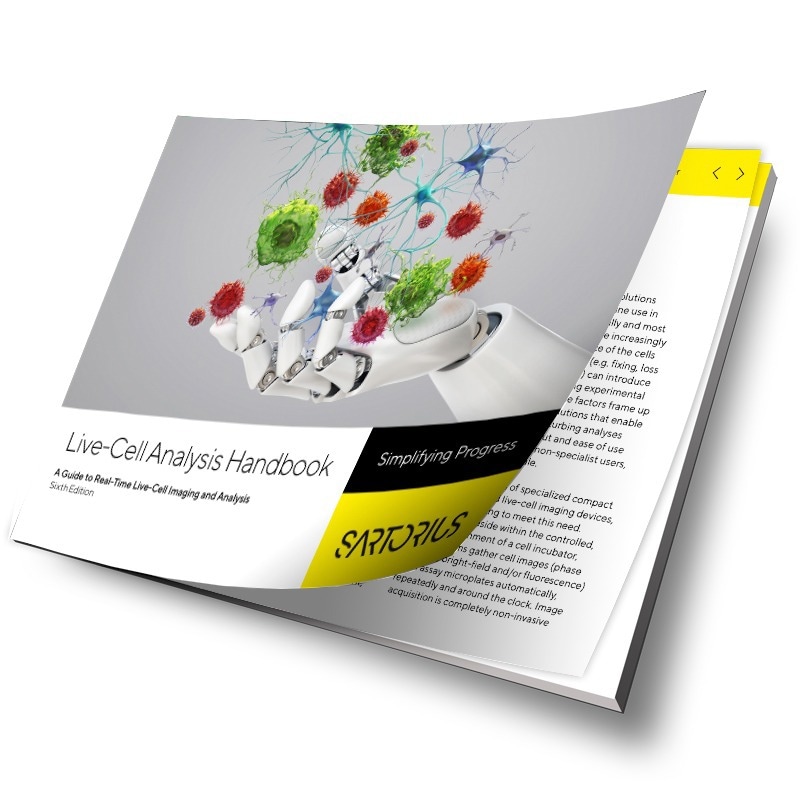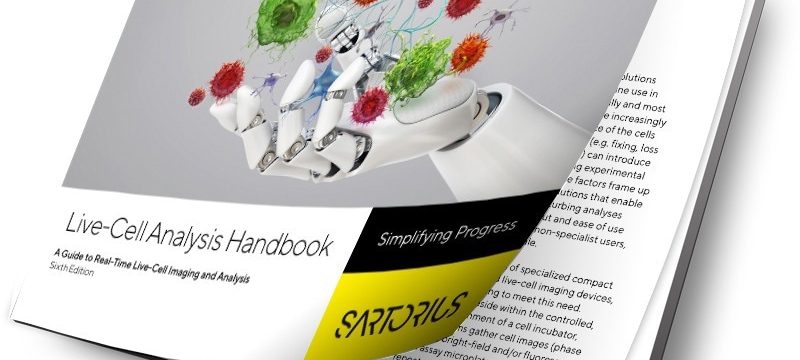Sartorius, a leader in new technologies for real-time, live-cell imaging and analysis, has released the 6th edition of its popular Live-Cell Analysis Handbook

Image Credit: Sartorius
The handbook was first launched in 2017 as a comprehensive reference guide for live-cell analysis technologies, focusing on the complete suite of Incucyte® live-cell assays and reagents. Since then, it’s become one of the most anticipated annual Sartorius publications, generating hundreds of downloads each year.
The focus of this edition is on the power of artificial intelligence (AI) to elevate live-cell image analysis to the next level. The ability to derive physiologically relevant data from datasets containing millions of cell microscopy images is a cornerstone of biopharmaceutical research, but this task has historically been highly resource-intensive and reliant on subjective interpretation.
New analysis tools powered by AI, such as the Incucyte® AI Cell Health Analysis Software Module, are bridging this gap to allow exploration of biological phenomena with greater statistical power.
This latest edition of our handbook features AI-driven analyses for label-free measurements of confluence and cell health for a wide variety of cell types and experimental conditions. The addition of this content highlights how the Incucyte enables customers to leverage deep learning in order to efficiently identify critical cell growth and health parameters to objectively and accurately make scientific decisions. We are excited to share how AI technology can be integrated into true live-cell biological workflows and the advantages of increased rep objective analysis and increased reproducibility in their data.
Belinda O’Clair, Head of BioAnalytics Reagents and Consumables Product Management, Sartorius
Other applications covered in the Live-Cell Analysis Handbook include cell culture quality control assays and kinetic assays for cell health and proliferation, cell function, cell movement and morphology, and assays for complex 3D models. New to this edition is real-time quantification of kinetic biosensor assays using genetically encoded biosensor assays for analyzing cancer cells. The Incucyte® Kinase Akt Assay measures dynamic changes in Akt activity, a serine/threonine protein kinase that is upregulated across various cancer types.
The Incucyte® Live-Cell Analysis System enables real-time, kinetic monitoring of a range of cell types, from proliferating tumor cells to sensitive primary cells, all from within the cell culture incubator.
Validated Incucyte® live-cell assays, reagents and protocols provide scientists with the tools to be able to explore more questions across a range of applications and research areas, without the limitations of laborious, end-point assays. Each year Sartorius scientists and product managers update this handbook to include the latest data and newest offerings in the Incucyte® live-cell assay portfolio.
Click here to download the free 6th Edition Live-Cell Analysis Handbook.
About Sartorius
The Sartorius Group is a leading international partner of biopharmaceutical research and the industry. With innovative laboratory instruments and consumables, the Group's Lab Products & Services Division concentrates on serving the needs of laboratories performing research and quality control at pharma and biopharma companies and those of academic research institutes. The Bioprocess Solutions Division with its broad product portfolio focusing on single-use solutions helps customers to manufacture biotech medications and vaccines safely and efficiently.
Sponsored Content Policy: News-Medical.net publishes articles and related content that may be derived from sources where we have existing commercial relationships, provided such content adds value to the core editorial ethos of News-Medical.Net which is to educate and inform site visitors interested in medical research, science, medical devices and treatments.
